Operations and Project Management: Tesco, Midland Case Study Report
VerifiedAdded on 2022/11/28
|11
|2813
|342
Report
AI Summary
This report provides a comprehensive analysis of operations and project management principles, using Tesco as a case study for operations management and Midland for project life cycle application. The report begins by reviewing and critiquing the implementation of operations management principles within Tesco, examining aspects like organization, accountability, change, collaboration, quality control, and causality. It then develops a continuous improvement plan for Tesco, incorporating SMART goals and strategies like the Six Sigma model. The second part of the report applies the project life cycle (PLC) to a Midland organization project, detailing each stage: initiation, planning, execution, and closure, along with supporting documentation. Finally, it reviews and critiques the effectiveness of the PLC in the Midland project, utilizing SWOT analysis to evaluate strengths, weaknesses, opportunities, and threats. The report aims to provide a practical understanding of operations and project management concepts and their application in real-world scenarios.
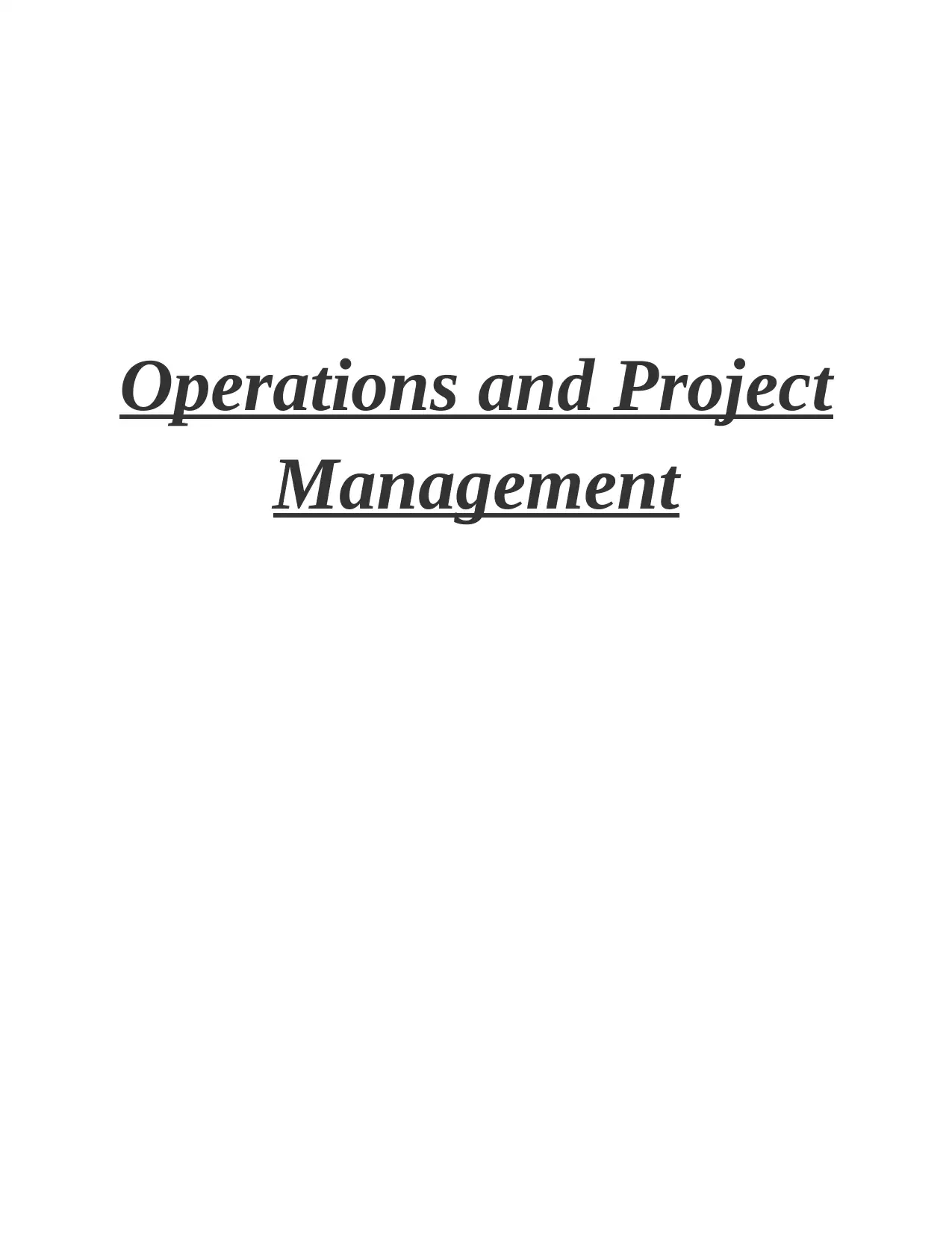
Operations and Project
Management
Management
Paraphrase This Document
Need a fresh take? Get an instant paraphrase of this document with our AI Paraphraser
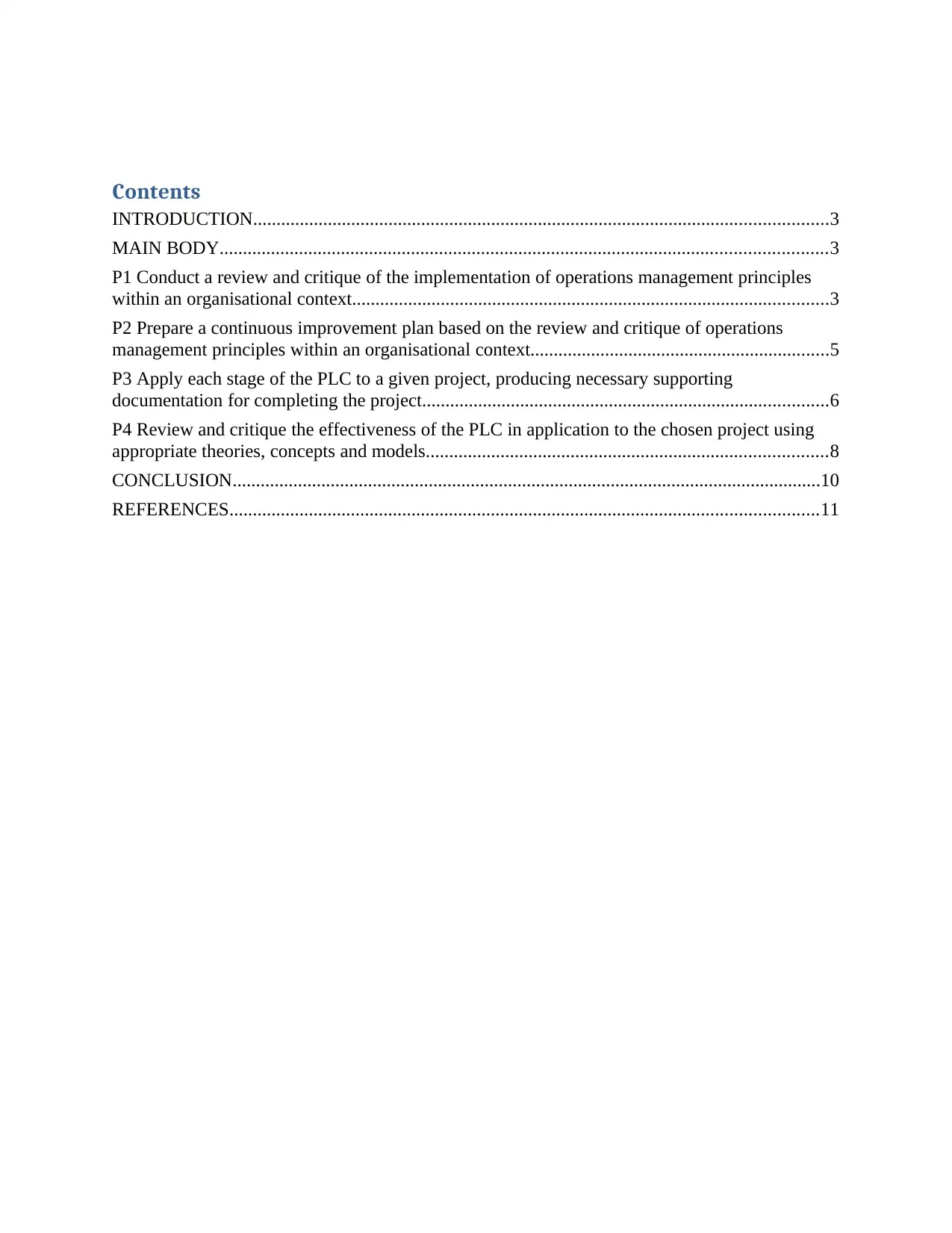
Contents
INTRODUCTION...........................................................................................................................3
MAIN BODY..................................................................................................................................3
P1 Conduct a review and critique of the implementation of operations management principles
within an organisational context......................................................................................................3
P2 Prepare a continuous improvement plan based on the review and critique of operations
management principles within an organisational context................................................................5
P3 Apply each stage of the PLC to a given project, producing necessary supporting
documentation for completing the project.......................................................................................6
P4 Review and critique the effectiveness of the PLC in application to the chosen project using
appropriate theories, concepts and models......................................................................................8
CONCLUSION..............................................................................................................................10
REFERENCES..............................................................................................................................11
INTRODUCTION...........................................................................................................................3
MAIN BODY..................................................................................................................................3
P1 Conduct a review and critique of the implementation of operations management principles
within an organisational context......................................................................................................3
P2 Prepare a continuous improvement plan based on the review and critique of operations
management principles within an organisational context................................................................5
P3 Apply each stage of the PLC to a given project, producing necessary supporting
documentation for completing the project.......................................................................................6
P4 Review and critique the effectiveness of the PLC in application to the chosen project using
appropriate theories, concepts and models......................................................................................8
CONCLUSION..............................................................................................................................10
REFERENCES..............................................................................................................................11
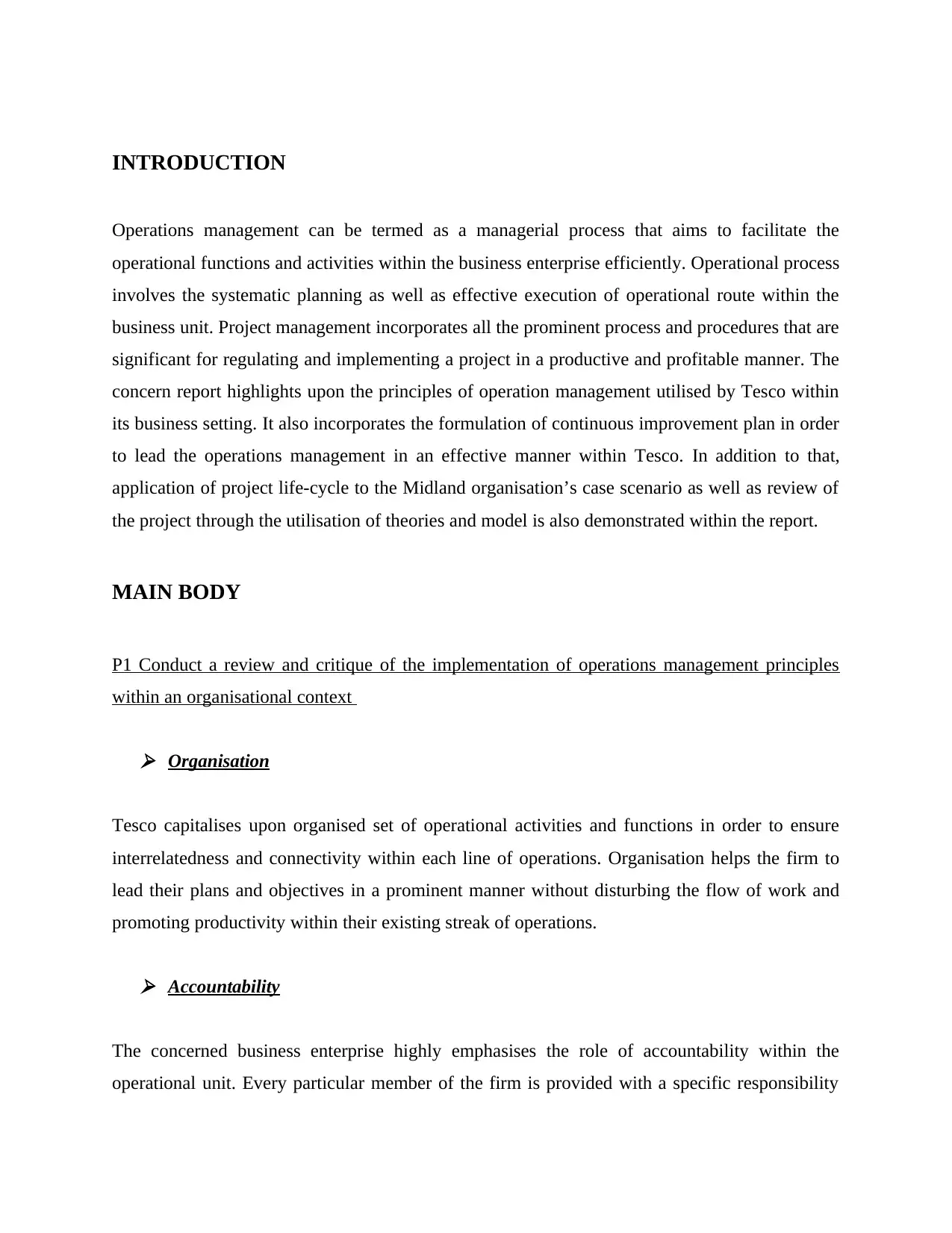
INTRODUCTION
Operations management can be termed as a managerial process that aims to facilitate the
operational functions and activities within the business enterprise efficiently. Operational process
involves the systematic planning as well as effective execution of operational route within the
business unit. Project management incorporates all the prominent process and procedures that are
significant for regulating and implementing a project in a productive and profitable manner. The
concern report highlights upon the principles of operation management utilised by Tesco within
its business setting. It also incorporates the formulation of continuous improvement plan in order
to lead the operations management in an effective manner within Tesco. In addition to that,
application of project life-cycle to the Midland organisation’s case scenario as well as review of
the project through the utilisation of theories and model is also demonstrated within the report.
MAIN BODY
P1 Conduct a review and critique of the implementation of operations management principles
within an organisational context
Organisation
Tesco capitalises upon organised set of operational activities and functions in order to ensure
interrelatedness and connectivity within each line of operations. Organisation helps the firm to
lead their plans and objectives in a prominent manner without disturbing the flow of work and
promoting productivity within their existing streak of operations.
Accountability
The concerned business enterprise highly emphasises the role of accountability within the
operational unit. Every particular member of the firm is provided with a specific responsibility
Operations management can be termed as a managerial process that aims to facilitate the
operational functions and activities within the business enterprise efficiently. Operational process
involves the systematic planning as well as effective execution of operational route within the
business unit. Project management incorporates all the prominent process and procedures that are
significant for regulating and implementing a project in a productive and profitable manner. The
concern report highlights upon the principles of operation management utilised by Tesco within
its business setting. It also incorporates the formulation of continuous improvement plan in order
to lead the operations management in an effective manner within Tesco. In addition to that,
application of project life-cycle to the Midland organisation’s case scenario as well as review of
the project through the utilisation of theories and model is also demonstrated within the report.
MAIN BODY
P1 Conduct a review and critique of the implementation of operations management principles
within an organisational context
Organisation
Tesco capitalises upon organised set of operational activities and functions in order to ensure
interrelatedness and connectivity within each line of operations. Organisation helps the firm to
lead their plans and objectives in a prominent manner without disturbing the flow of work and
promoting productivity within their existing streak of operations.
Accountability
The concerned business enterprise highly emphasises the role of accountability within the
operational unit. Every particular member of the firm is provided with a specific responsibility
⊘ This is a preview!⊘
Do you want full access?
Subscribe today to unlock all pages.

Trusted by 1+ million students worldwide
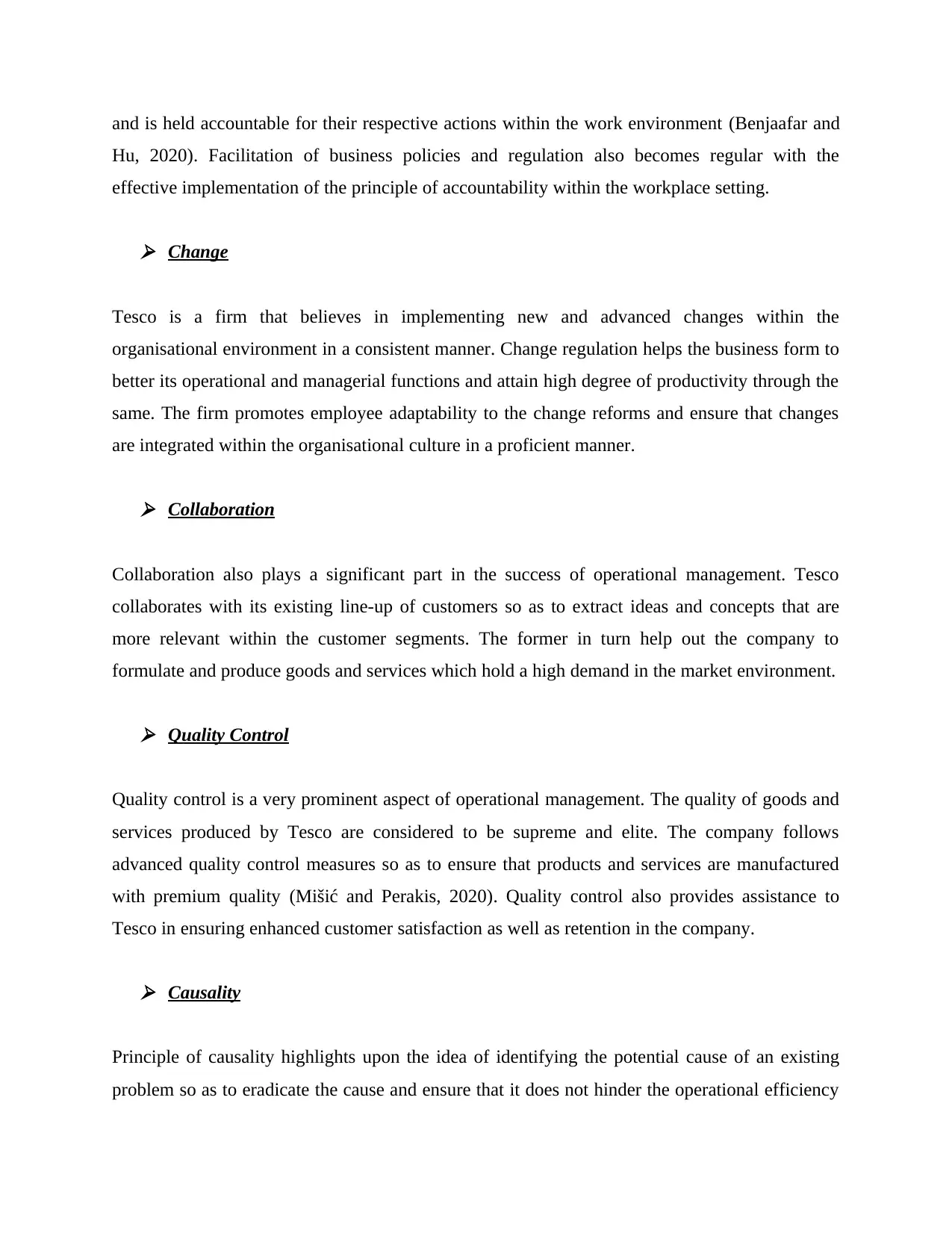
and is held accountable for their respective actions within the work environment (Benjaafar and
Hu, 2020). Facilitation of business policies and regulation also becomes regular with the
effective implementation of the principle of accountability within the workplace setting.
Change
Tesco is a firm that believes in implementing new and advanced changes within the
organisational environment in a consistent manner. Change regulation helps the business form to
better its operational and managerial functions and attain high degree of productivity through the
same. The firm promotes employee adaptability to the change reforms and ensure that changes
are integrated within the organisational culture in a proficient manner.
Collaboration
Collaboration also plays a significant part in the success of operational management. Tesco
collaborates with its existing line-up of customers so as to extract ideas and concepts that are
more relevant within the customer segments. The former in turn help out the company to
formulate and produce goods and services which hold a high demand in the market environment.
Quality Control
Quality control is a very prominent aspect of operational management. The quality of goods and
services produced by Tesco are considered to be supreme and elite. The company follows
advanced quality control measures so as to ensure that products and services are manufactured
with premium quality (Mišić and Perakis, 2020). Quality control also provides assistance to
Tesco in ensuring enhanced customer satisfaction as well as retention in the company.
Causality
Principle of causality highlights upon the idea of identifying the potential cause of an existing
problem so as to eradicate the cause and ensure that it does not hinder the operational efficiency
Hu, 2020). Facilitation of business policies and regulation also becomes regular with the
effective implementation of the principle of accountability within the workplace setting.
Change
Tesco is a firm that believes in implementing new and advanced changes within the
organisational environment in a consistent manner. Change regulation helps the business form to
better its operational and managerial functions and attain high degree of productivity through the
same. The firm promotes employee adaptability to the change reforms and ensure that changes
are integrated within the organisational culture in a proficient manner.
Collaboration
Collaboration also plays a significant part in the success of operational management. Tesco
collaborates with its existing line-up of customers so as to extract ideas and concepts that are
more relevant within the customer segments. The former in turn help out the company to
formulate and produce goods and services which hold a high demand in the market environment.
Quality Control
Quality control is a very prominent aspect of operational management. The quality of goods and
services produced by Tesco are considered to be supreme and elite. The company follows
advanced quality control measures so as to ensure that products and services are manufactured
with premium quality (Mišić and Perakis, 2020). Quality control also provides assistance to
Tesco in ensuring enhanced customer satisfaction as well as retention in the company.
Causality
Principle of causality highlights upon the idea of identifying the potential cause of an existing
problem so as to eradicate the cause and ensure that it does not hinder the operational efficiency
Paraphrase This Document
Need a fresh take? Get an instant paraphrase of this document with our AI Paraphraser
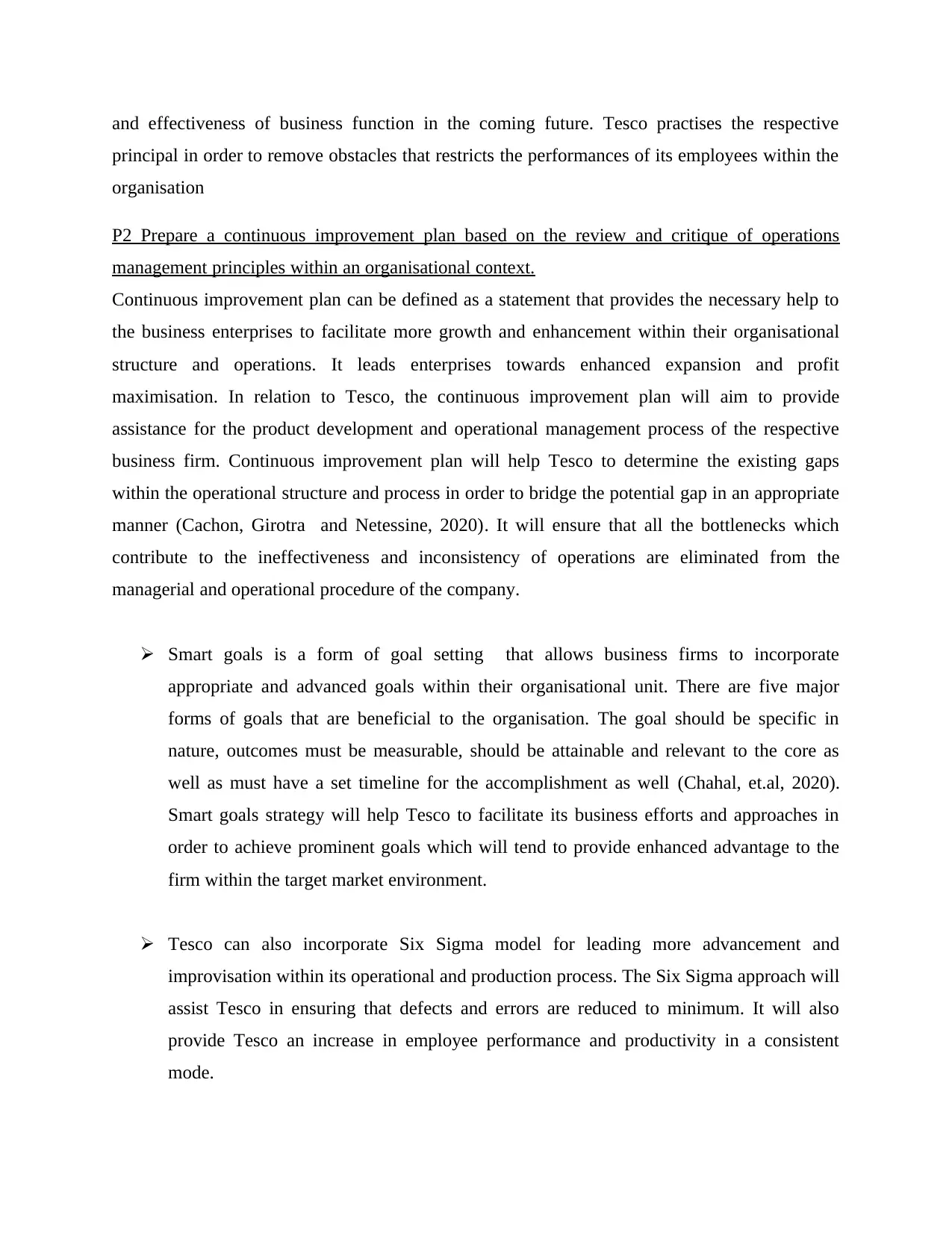
and effectiveness of business function in the coming future. Tesco practises the respective
principal in order to remove obstacles that restricts the performances of its employees within the
organisation
P2 Prepare a continuous improvement plan based on the review and critique of operations
management principles within an organisational context.
Continuous improvement plan can be defined as a statement that provides the necessary help to
the business enterprises to facilitate more growth and enhancement within their organisational
structure and operations. It leads enterprises towards enhanced expansion and profit
maximisation. In relation to Tesco, the continuous improvement plan will aim to provide
assistance for the product development and operational management process of the respective
business firm. Continuous improvement plan will help Tesco to determine the existing gaps
within the operational structure and process in order to bridge the potential gap in an appropriate
manner (Cachon, Girotra and Netessine, 2020). It will ensure that all the bottlenecks which
contribute to the ineffectiveness and inconsistency of operations are eliminated from the
managerial and operational procedure of the company.
Smart goals is a form of goal setting that allows business firms to incorporate
appropriate and advanced goals within their organisational unit. There are five major
forms of goals that are beneficial to the organisation. The goal should be specific in
nature, outcomes must be measurable, should be attainable and relevant to the core as
well as must have a set timeline for the accomplishment as well (Chahal, et.al, 2020).
Smart goals strategy will help Tesco to facilitate its business efforts and approaches in
order to achieve prominent goals which will tend to provide enhanced advantage to the
firm within the target market environment.
Tesco can also incorporate Six Sigma model for leading more advancement and
improvisation within its operational and production process. The Six Sigma approach will
assist Tesco in ensuring that defects and errors are reduced to minimum. It will also
provide Tesco an increase in employee performance and productivity in a consistent
mode.
principal in order to remove obstacles that restricts the performances of its employees within the
organisation
P2 Prepare a continuous improvement plan based on the review and critique of operations
management principles within an organisational context.
Continuous improvement plan can be defined as a statement that provides the necessary help to
the business enterprises to facilitate more growth and enhancement within their organisational
structure and operations. It leads enterprises towards enhanced expansion and profit
maximisation. In relation to Tesco, the continuous improvement plan will aim to provide
assistance for the product development and operational management process of the respective
business firm. Continuous improvement plan will help Tesco to determine the existing gaps
within the operational structure and process in order to bridge the potential gap in an appropriate
manner (Cachon, Girotra and Netessine, 2020). It will ensure that all the bottlenecks which
contribute to the ineffectiveness and inconsistency of operations are eliminated from the
managerial and operational procedure of the company.
Smart goals is a form of goal setting that allows business firms to incorporate
appropriate and advanced goals within their organisational unit. There are five major
forms of goals that are beneficial to the organisation. The goal should be specific in
nature, outcomes must be measurable, should be attainable and relevant to the core as
well as must have a set timeline for the accomplishment as well (Chahal, et.al, 2020).
Smart goals strategy will help Tesco to facilitate its business efforts and approaches in
order to achieve prominent goals which will tend to provide enhanced advantage to the
firm within the target market environment.
Tesco can also incorporate Six Sigma model for leading more advancement and
improvisation within its operational and production process. The Six Sigma approach will
assist Tesco in ensuring that defects and errors are reduced to minimum. It will also
provide Tesco an increase in employee performance and productivity in a consistent
mode.
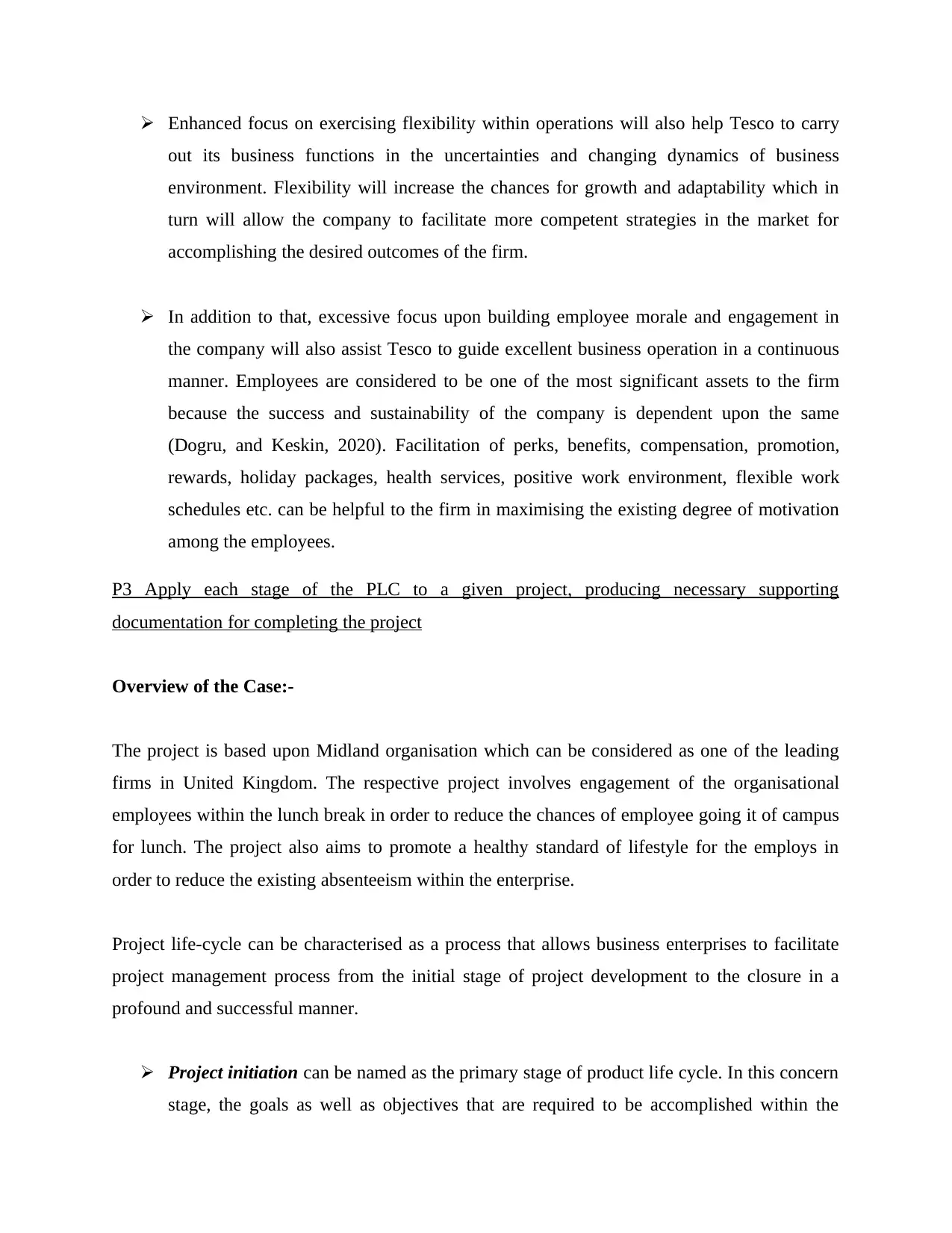
Enhanced focus on exercising flexibility within operations will also help Tesco to carry
out its business functions in the uncertainties and changing dynamics of business
environment. Flexibility will increase the chances for growth and adaptability which in
turn will allow the company to facilitate more competent strategies in the market for
accomplishing the desired outcomes of the firm.
In addition to that, excessive focus upon building employee morale and engagement in
the company will also assist Tesco to guide excellent business operation in a continuous
manner. Employees are considered to be one of the most significant assets to the firm
because the success and sustainability of the company is dependent upon the same
(Dogru, and Keskin, 2020). Facilitation of perks, benefits, compensation, promotion,
rewards, holiday packages, health services, positive work environment, flexible work
schedules etc. can be helpful to the firm in maximising the existing degree of motivation
among the employees.
P3 Apply each stage of the PLC to a given project, producing necessary supporting
documentation for completing the project
Overview of the Case:-
The project is based upon Midland organisation which can be considered as one of the leading
firms in United Kingdom. The respective project involves engagement of the organisational
employees within the lunch break in order to reduce the chances of employee going it of campus
for lunch. The project also aims to promote a healthy standard of lifestyle for the employs in
order to reduce the existing absenteeism within the enterprise.
Project life-cycle can be characterised as a process that allows business enterprises to facilitate
project management process from the initial stage of project development to the closure in a
profound and successful manner.
Project initiation can be named as the primary stage of product life cycle. In this concern
stage, the goals as well as objectives that are required to be accomplished within the
out its business functions in the uncertainties and changing dynamics of business
environment. Flexibility will increase the chances for growth and adaptability which in
turn will allow the company to facilitate more competent strategies in the market for
accomplishing the desired outcomes of the firm.
In addition to that, excessive focus upon building employee morale and engagement in
the company will also assist Tesco to guide excellent business operation in a continuous
manner. Employees are considered to be one of the most significant assets to the firm
because the success and sustainability of the company is dependent upon the same
(Dogru, and Keskin, 2020). Facilitation of perks, benefits, compensation, promotion,
rewards, holiday packages, health services, positive work environment, flexible work
schedules etc. can be helpful to the firm in maximising the existing degree of motivation
among the employees.
P3 Apply each stage of the PLC to a given project, producing necessary supporting
documentation for completing the project
Overview of the Case:-
The project is based upon Midland organisation which can be considered as one of the leading
firms in United Kingdom. The respective project involves engagement of the organisational
employees within the lunch break in order to reduce the chances of employee going it of campus
for lunch. The project also aims to promote a healthy standard of lifestyle for the employs in
order to reduce the existing absenteeism within the enterprise.
Project life-cycle can be characterised as a process that allows business enterprises to facilitate
project management process from the initial stage of project development to the closure in a
profound and successful manner.
Project initiation can be named as the primary stage of product life cycle. In this concern
stage, the goals as well as objectives that are required to be accomplished within the
⊘ This is a preview!⊘
Do you want full access?
Subscribe today to unlock all pages.

Trusted by 1+ million students worldwide
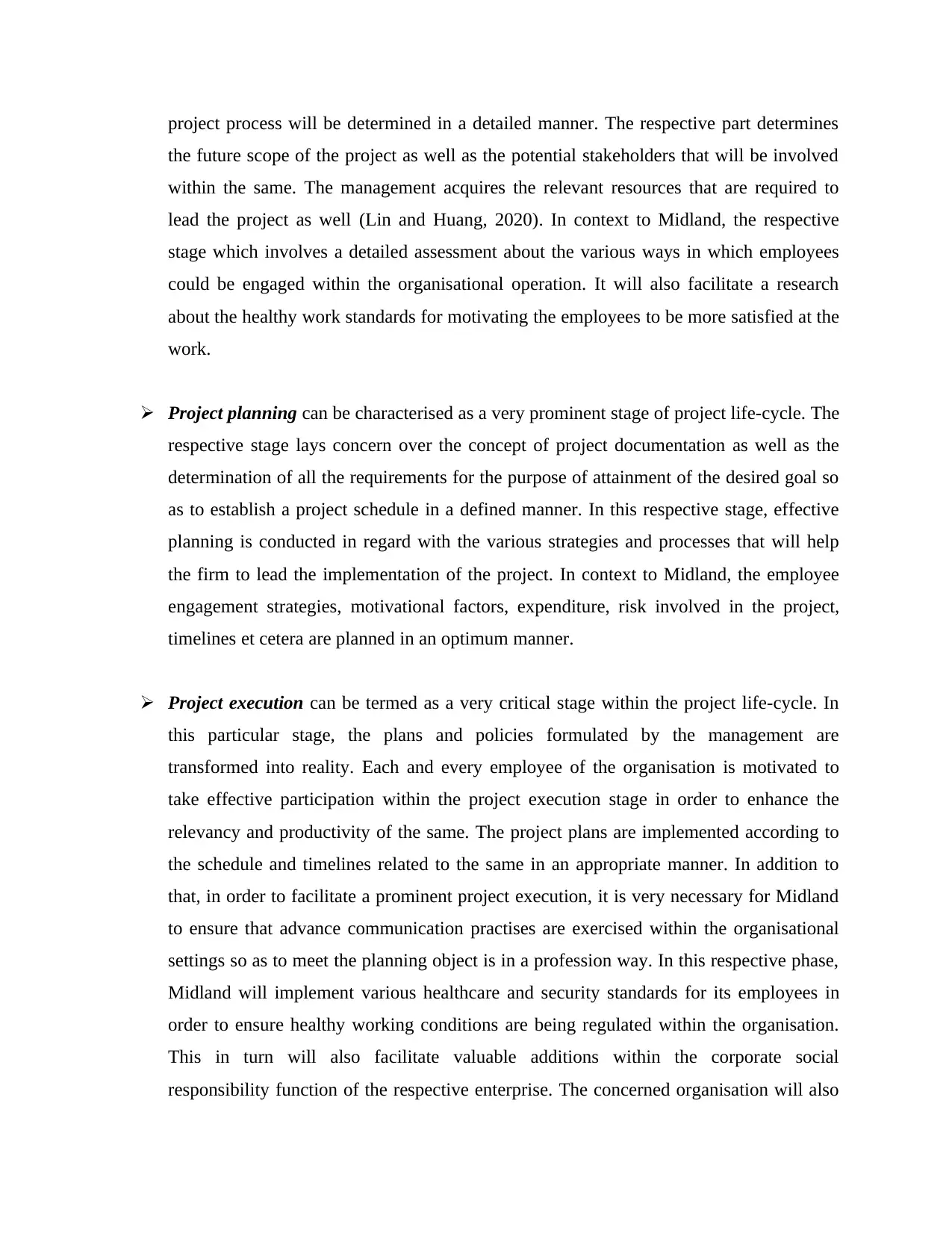
project process will be determined in a detailed manner. The respective part determines
the future scope of the project as well as the potential stakeholders that will be involved
within the same. The management acquires the relevant resources that are required to
lead the project as well (Lin and Huang, 2020). In context to Midland, the respective
stage which involves a detailed assessment about the various ways in which employees
could be engaged within the organisational operation. It will also facilitate a research
about the healthy work standards for motivating the employees to be more satisfied at the
work.
Project planning can be characterised as a very prominent stage of project life-cycle. The
respective stage lays concern over the concept of project documentation as well as the
determination of all the requirements for the purpose of attainment of the desired goal so
as to establish a project schedule in a defined manner. In this respective stage, effective
planning is conducted in regard with the various strategies and processes that will help
the firm to lead the implementation of the project. In context to Midland, the employee
engagement strategies, motivational factors, expenditure, risk involved in the project,
timelines et cetera are planned in an optimum manner.
Project execution can be termed as a very critical stage within the project life-cycle. In
this particular stage, the plans and policies formulated by the management are
transformed into reality. Each and every employee of the organisation is motivated to
take effective participation within the project execution stage in order to enhance the
relevancy and productivity of the same. The project plans are implemented according to
the schedule and timelines related to the same in an appropriate manner. In addition to
that, in order to facilitate a prominent project execution, it is very necessary for Midland
to ensure that advance communication practises are exercised within the organisational
settings so as to meet the planning object is in a profession way. In this respective phase,
Midland will implement various healthcare and security standards for its employees in
order to ensure healthy working conditions are being regulated within the organisation.
This in turn will also facilitate valuable additions within the corporate social
responsibility function of the respective enterprise. The concerned organisation will also
the future scope of the project as well as the potential stakeholders that will be involved
within the same. The management acquires the relevant resources that are required to
lead the project as well (Lin and Huang, 2020). In context to Midland, the respective
stage which involves a detailed assessment about the various ways in which employees
could be engaged within the organisational operation. It will also facilitate a research
about the healthy work standards for motivating the employees to be more satisfied at the
work.
Project planning can be characterised as a very prominent stage of project life-cycle. The
respective stage lays concern over the concept of project documentation as well as the
determination of all the requirements for the purpose of attainment of the desired goal so
as to establish a project schedule in a defined manner. In this respective stage, effective
planning is conducted in regard with the various strategies and processes that will help
the firm to lead the implementation of the project. In context to Midland, the employee
engagement strategies, motivational factors, expenditure, risk involved in the project,
timelines et cetera are planned in an optimum manner.
Project execution can be termed as a very critical stage within the project life-cycle. In
this particular stage, the plans and policies formulated by the management are
transformed into reality. Each and every employee of the organisation is motivated to
take effective participation within the project execution stage in order to enhance the
relevancy and productivity of the same. The project plans are implemented according to
the schedule and timelines related to the same in an appropriate manner. In addition to
that, in order to facilitate a prominent project execution, it is very necessary for Midland
to ensure that advance communication practises are exercised within the organisational
settings so as to meet the planning object is in a profession way. In this respective phase,
Midland will implement various healthcare and security standards for its employees in
order to ensure healthy working conditions are being regulated within the organisation.
This in turn will also facilitate valuable additions within the corporate social
responsibility function of the respective enterprise. The concerned organisation will also
Paraphrase This Document
Need a fresh take? Get an instant paraphrase of this document with our AI Paraphraser
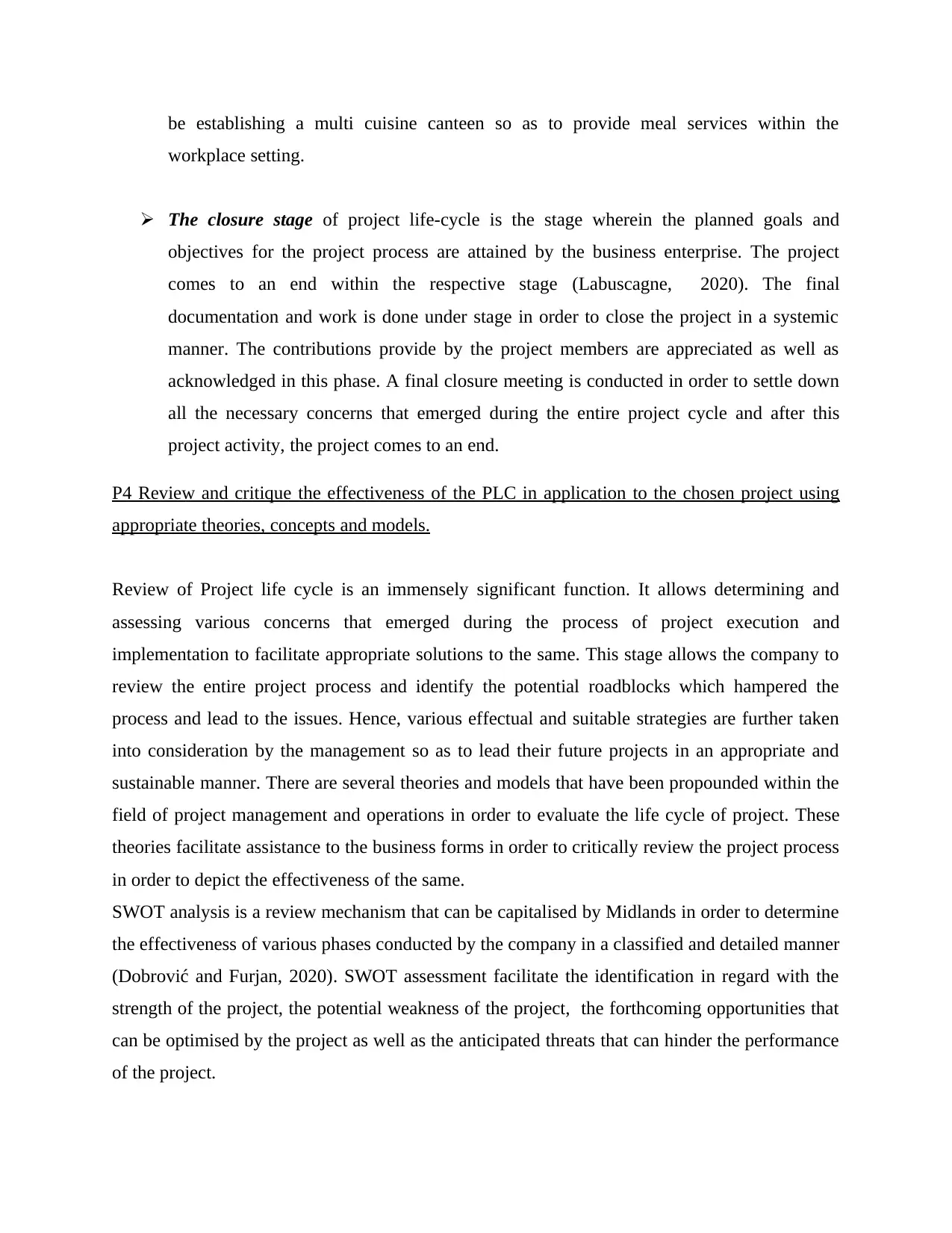
be establishing a multi cuisine canteen so as to provide meal services within the
workplace setting.
The closure stage of project life-cycle is the stage wherein the planned goals and
objectives for the project process are attained by the business enterprise. The project
comes to an end within the respective stage (Labuscagne, 2020). The final
documentation and work is done under stage in order to close the project in a systemic
manner. The contributions provide by the project members are appreciated as well as
acknowledged in this phase. A final closure meeting is conducted in order to settle down
all the necessary concerns that emerged during the entire project cycle and after this
project activity, the project comes to an end.
P4 Review and critique the effectiveness of the PLC in application to the chosen project using
appropriate theories, concepts and models.
Review of Project life cycle is an immensely significant function. It allows determining and
assessing various concerns that emerged during the process of project execution and
implementation to facilitate appropriate solutions to the same. This stage allows the company to
review the entire project process and identify the potential roadblocks which hampered the
process and lead to the issues. Hence, various effectual and suitable strategies are further taken
into consideration by the management so as to lead their future projects in an appropriate and
sustainable manner. There are several theories and models that have been propounded within the
field of project management and operations in order to evaluate the life cycle of project. These
theories facilitate assistance to the business forms in order to critically review the project process
in order to depict the effectiveness of the same.
SWOT analysis is a review mechanism that can be capitalised by Midlands in order to determine
the effectiveness of various phases conducted by the company in a classified and detailed manner
(Dobrović and Furjan, 2020). SWOT assessment facilitate the identification in regard with the
strength of the project, the potential weakness of the project, the forthcoming opportunities that
can be optimised by the project as well as the anticipated threats that can hinder the performance
of the project.
workplace setting.
The closure stage of project life-cycle is the stage wherein the planned goals and
objectives for the project process are attained by the business enterprise. The project
comes to an end within the respective stage (Labuscagne, 2020). The final
documentation and work is done under stage in order to close the project in a systemic
manner. The contributions provide by the project members are appreciated as well as
acknowledged in this phase. A final closure meeting is conducted in order to settle down
all the necessary concerns that emerged during the entire project cycle and after this
project activity, the project comes to an end.
P4 Review and critique the effectiveness of the PLC in application to the chosen project using
appropriate theories, concepts and models.
Review of Project life cycle is an immensely significant function. It allows determining and
assessing various concerns that emerged during the process of project execution and
implementation to facilitate appropriate solutions to the same. This stage allows the company to
review the entire project process and identify the potential roadblocks which hampered the
process and lead to the issues. Hence, various effectual and suitable strategies are further taken
into consideration by the management so as to lead their future projects in an appropriate and
sustainable manner. There are several theories and models that have been propounded within the
field of project management and operations in order to evaluate the life cycle of project. These
theories facilitate assistance to the business forms in order to critically review the project process
in order to depict the effectiveness of the same.
SWOT analysis is a review mechanism that can be capitalised by Midlands in order to determine
the effectiveness of various phases conducted by the company in a classified and detailed manner
(Dobrović and Furjan, 2020). SWOT assessment facilitate the identification in regard with the
strength of the project, the potential weakness of the project, the forthcoming opportunities that
can be optimised by the project as well as the anticipated threats that can hinder the performance
of the project.
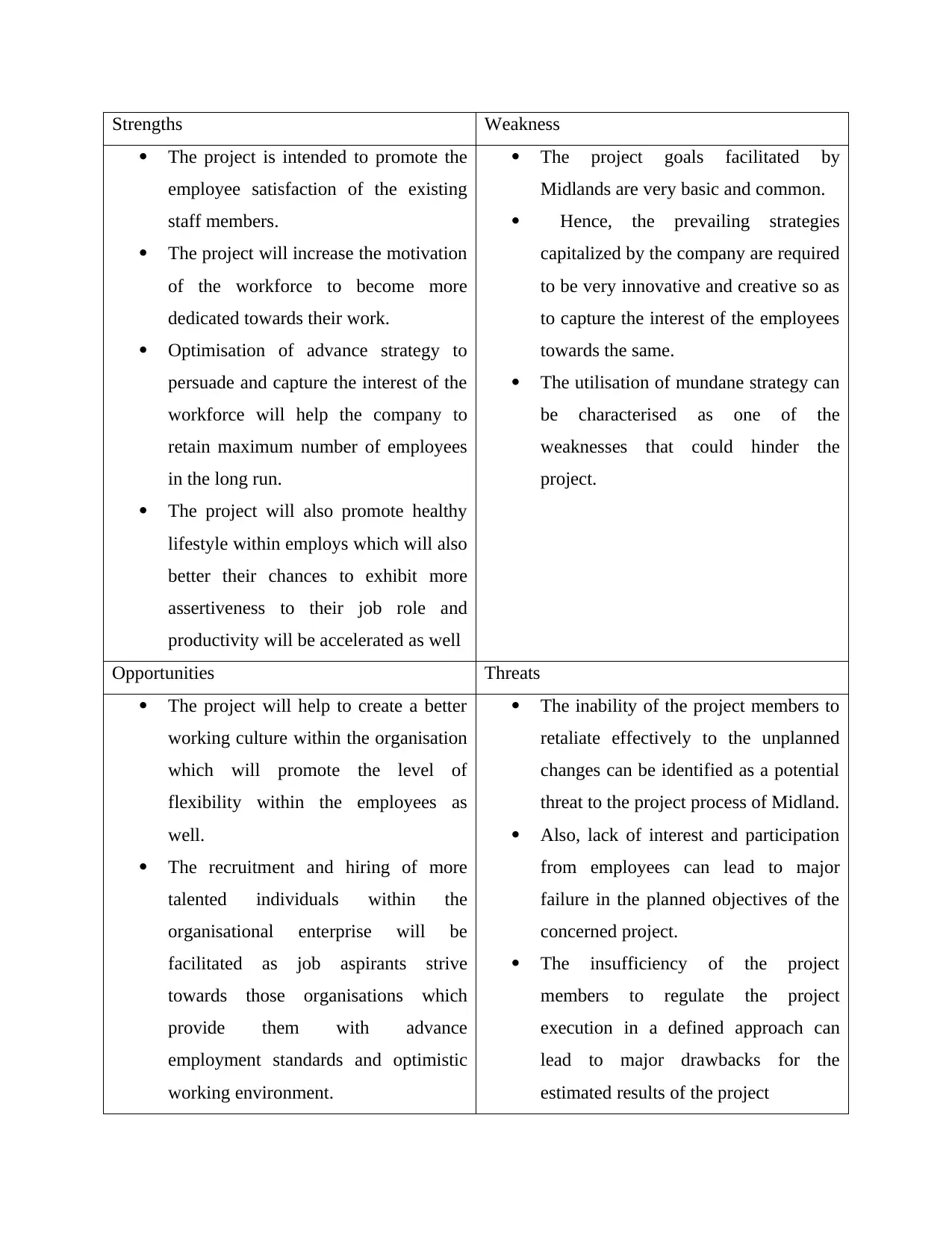
Strengths Weakness
The project is intended to promote the
employee satisfaction of the existing
staff members.
The project will increase the motivation
of the workforce to become more
dedicated towards their work.
Optimisation of advance strategy to
persuade and capture the interest of the
workforce will help the company to
retain maximum number of employees
in the long run.
The project will also promote healthy
lifestyle within employs which will also
better their chances to exhibit more
assertiveness to their job role and
productivity will be accelerated as well
The project goals facilitated by
Midlands are very basic and common.
Hence, the prevailing strategies
capitalized by the company are required
to be very innovative and creative so as
to capture the interest of the employees
towards the same.
The utilisation of mundane strategy can
be characterised as one of the
weaknesses that could hinder the
project.
Opportunities Threats
The project will help to create a better
working culture within the organisation
which will promote the level of
flexibility within the employees as
well.
The recruitment and hiring of more
talented individuals within the
organisational enterprise will be
facilitated as job aspirants strive
towards those organisations which
provide them with advance
employment standards and optimistic
working environment.
The inability of the project members to
retaliate effectively to the unplanned
changes can be identified as a potential
threat to the project process of Midland.
Also, lack of interest and participation
from employees can lead to major
failure in the planned objectives of the
concerned project.
The insufficiency of the project
members to regulate the project
execution in a defined approach can
lead to major drawbacks for the
estimated results of the project
The project is intended to promote the
employee satisfaction of the existing
staff members.
The project will increase the motivation
of the workforce to become more
dedicated towards their work.
Optimisation of advance strategy to
persuade and capture the interest of the
workforce will help the company to
retain maximum number of employees
in the long run.
The project will also promote healthy
lifestyle within employs which will also
better their chances to exhibit more
assertiveness to their job role and
productivity will be accelerated as well
The project goals facilitated by
Midlands are very basic and common.
Hence, the prevailing strategies
capitalized by the company are required
to be very innovative and creative so as
to capture the interest of the employees
towards the same.
The utilisation of mundane strategy can
be characterised as one of the
weaknesses that could hinder the
project.
Opportunities Threats
The project will help to create a better
working culture within the organisation
which will promote the level of
flexibility within the employees as
well.
The recruitment and hiring of more
talented individuals within the
organisational enterprise will be
facilitated as job aspirants strive
towards those organisations which
provide them with advance
employment standards and optimistic
working environment.
The inability of the project members to
retaliate effectively to the unplanned
changes can be identified as a potential
threat to the project process of Midland.
Also, lack of interest and participation
from employees can lead to major
failure in the planned objectives of the
concerned project.
The insufficiency of the project
members to regulate the project
execution in a defined approach can
lead to major drawbacks for the
estimated results of the project
⊘ This is a preview!⊘
Do you want full access?
Subscribe today to unlock all pages.

Trusted by 1+ million students worldwide
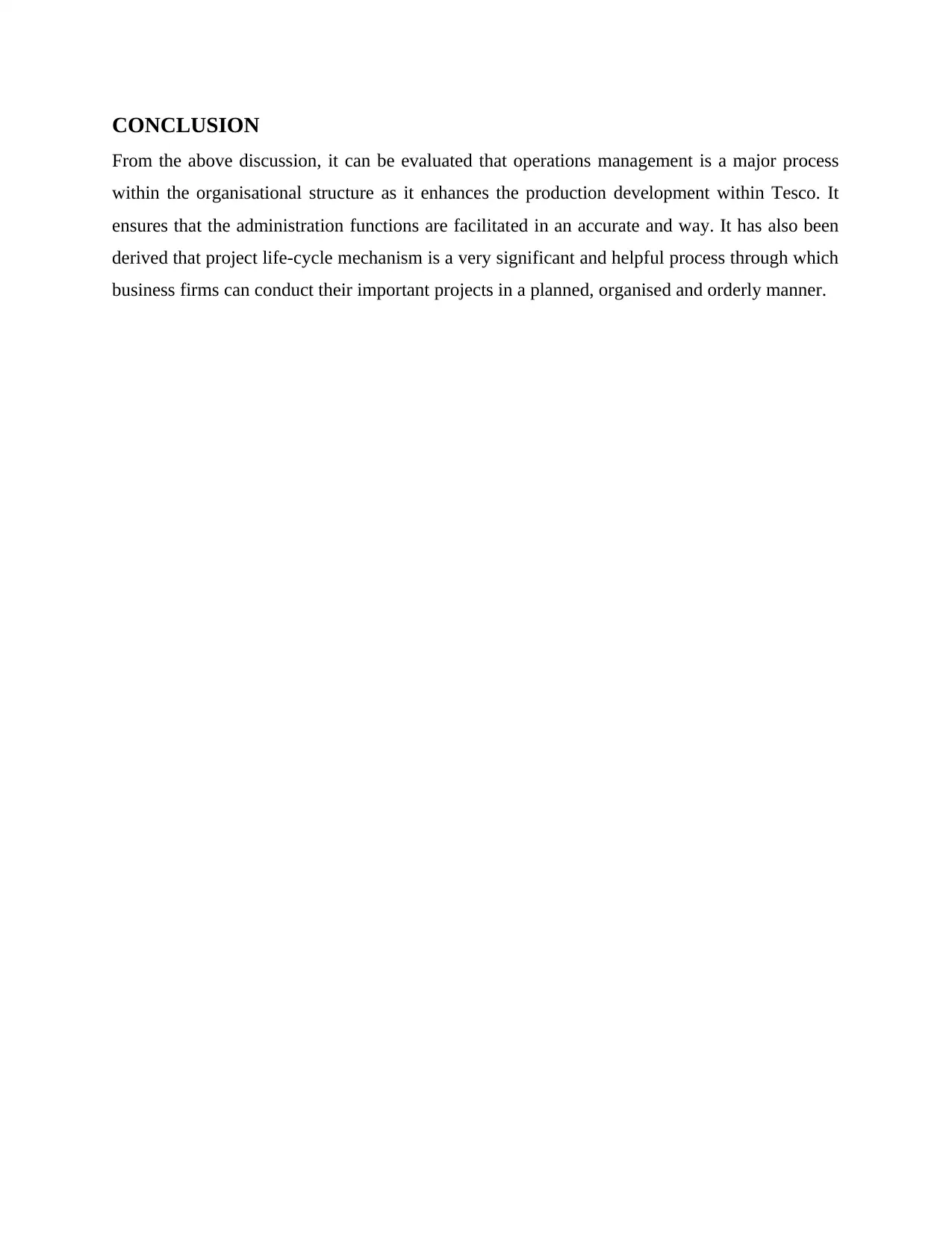
CONCLUSION
From the above discussion, it can be evaluated that operations management is a major process
within the organisational structure as it enhances the production development within Tesco. It
ensures that the administration functions are facilitated in an accurate and way. It has also been
derived that project life-cycle mechanism is a very significant and helpful process through which
business firms can conduct their important projects in a planned, organised and orderly manner.
From the above discussion, it can be evaluated that operations management is a major process
within the organisational structure as it enhances the production development within Tesco. It
ensures that the administration functions are facilitated in an accurate and way. It has also been
derived that project life-cycle mechanism is a very significant and helpful process through which
business firms can conduct their important projects in a planned, organised and orderly manner.
Paraphrase This Document
Need a fresh take? Get an instant paraphrase of this document with our AI Paraphraser
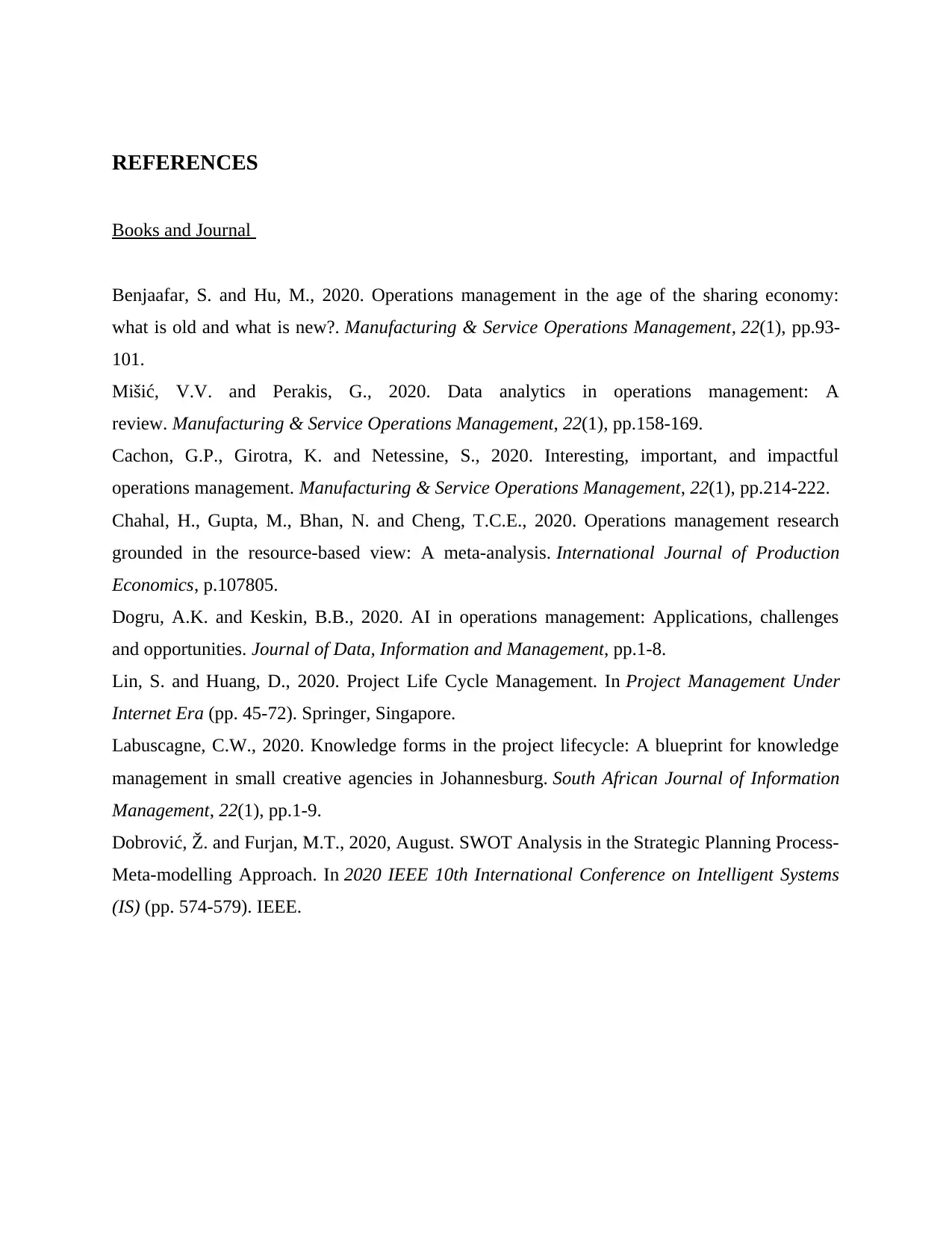
REFERENCES
Books and Journal
Benjaafar, S. and Hu, M., 2020. Operations management in the age of the sharing economy:
what is old and what is new?. Manufacturing & Service Operations Management, 22(1), pp.93-
101.
Mišić, V.V. and Perakis, G., 2020. Data analytics in operations management: A
review. Manufacturing & Service Operations Management, 22(1), pp.158-169.
Cachon, G.P., Girotra, K. and Netessine, S., 2020. Interesting, important, and impactful
operations management. Manufacturing & Service Operations Management, 22(1), pp.214-222.
Chahal, H., Gupta, M., Bhan, N. and Cheng, T.C.E., 2020. Operations management research
grounded in the resource-based view: A meta-analysis. International Journal of Production
Economics, p.107805.
Dogru, A.K. and Keskin, B.B., 2020. AI in operations management: Applications, challenges
and opportunities. Journal of Data, Information and Management, pp.1-8.
Lin, S. and Huang, D., 2020. Project Life Cycle Management. In Project Management Under
Internet Era (pp. 45-72). Springer, Singapore.
Labuscagne, C.W., 2020. Knowledge forms in the project lifecycle: A blueprint for knowledge
management in small creative agencies in Johannesburg. South African Journal of Information
Management, 22(1), pp.1-9.
Dobrović, Ž. and Furjan, M.T., 2020, August. SWOT Analysis in the Strategic Planning Process-
Meta-modelling Approach. In 2020 IEEE 10th International Conference on Intelligent Systems
(IS) (pp. 574-579). IEEE.
Books and Journal
Benjaafar, S. and Hu, M., 2020. Operations management in the age of the sharing economy:
what is old and what is new?. Manufacturing & Service Operations Management, 22(1), pp.93-
101.
Mišić, V.V. and Perakis, G., 2020. Data analytics in operations management: A
review. Manufacturing & Service Operations Management, 22(1), pp.158-169.
Cachon, G.P., Girotra, K. and Netessine, S., 2020. Interesting, important, and impactful
operations management. Manufacturing & Service Operations Management, 22(1), pp.214-222.
Chahal, H., Gupta, M., Bhan, N. and Cheng, T.C.E., 2020. Operations management research
grounded in the resource-based view: A meta-analysis. International Journal of Production
Economics, p.107805.
Dogru, A.K. and Keskin, B.B., 2020. AI in operations management: Applications, challenges
and opportunities. Journal of Data, Information and Management, pp.1-8.
Lin, S. and Huang, D., 2020. Project Life Cycle Management. In Project Management Under
Internet Era (pp. 45-72). Springer, Singapore.
Labuscagne, C.W., 2020. Knowledge forms in the project lifecycle: A blueprint for knowledge
management in small creative agencies in Johannesburg. South African Journal of Information
Management, 22(1), pp.1-9.
Dobrović, Ž. and Furjan, M.T., 2020, August. SWOT Analysis in the Strategic Planning Process-
Meta-modelling Approach. In 2020 IEEE 10th International Conference on Intelligent Systems
(IS) (pp. 574-579). IEEE.
1 out of 11